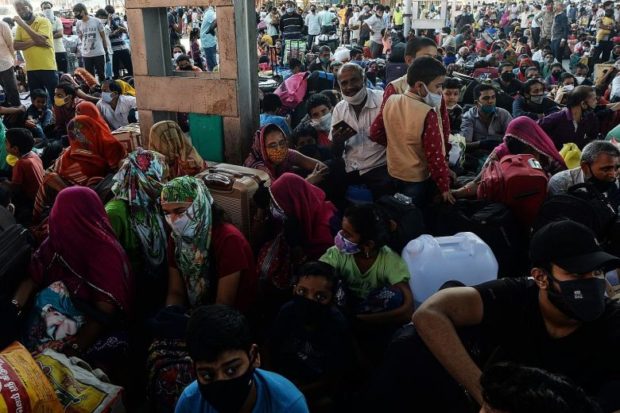
People waiting to board a train to Rajasthan at MGR Central railway station in Chennai on Thursday. Since mid-May, curbs have been eased in India, including on the cross-country movement of people. AGENCE FRANCE-PRESSE via The Straits Times/Asia News Network
NEW DELHI — Life in the world’s second-most populous country has been slowly assuming a new normal after a stringent lockdown was eased.
Many Indians have learnt to wear masks as a matter of routine in spite of the stifling heat, which has reached – and in places, surpassed – 40 deg C.
Economic activity has resumed, with malls, shops, restaurants and hotels reopening.
Yet the country, once grappling with only a few hundred cases of Covid-19 during the strictest part of the lockdown, now has about 822,000 cases, with more than 20,000 new infections a day.
India has overtaken Russia to become the third-most-affected country, though the government and experts note that comparing the total number of cases per country is not fair, given India’s population.
Still, the upward trajectory of new infections remains a matter of worry.
“The rise in cases is certainly worrisome and requires a lot of attention and action,” said Professor K. Srinath Reddy, president of the Public Health Foundation of India and a member of the Indian Council of Medical Research Covid-19 Task Force.
“We are still going through the first phase. When people talk about whether it has peaked, they have to understand we are not dealing with a single mountain. We are dealing with a mountain range. And you have to travel across those peaks at different time periods.”
In India, government action varies from state to state. Some states like Kerala have been able to get the infection under control but have seen a resurgence, while others like Maharashtra are still working to curb the spread of the virus.
India saw a complete cessation of economic activity starting on March 25. Domestic flights were grounded and train services were stopped, along with all industrial activity.
Since mid-May, restrictions have been eased, including on the cross-country movement of people, which is seen as a factor behind the rise of new infections.
Big cities like capital city Delhi, financial capital Mumbai and Chennai have been the worst affected, with medical infrastructure initially coming under immense strain amid a desperate search for hospital beds.
The cities have since upgraded their capabilities, adding more beds.
Delhi has even started stabilizing, with more recoveries than new cases, a trend the authorities hope will continue, but new hot spots like Telangana and Karnataka, where the loosening of strict vigilance and contact tracing led to a spike in cases, have now emerged.
As cases have spiked, some states have gone back to imposing lockdowns.
The central state of Madhya Pradesh has announced a total lockdown only on Sundays to rein in new cases, while the southern state of Kerala has put its capital city Thiruvananthapuram under a week-long lockdown that started on Monday, after cases emerged that the authorities were unable to trace. Uttar Pradesh started a three-day lockdown on Friday.
Experts said that the country needed to continue strengthening its testing capacity, expedite contact tracing and isolate those infected.
An MIT Sloan School of Management study has predicted India may record the highest number of fresh cases in the world by the end of next year, with 287,000 infections a day.
“We can try to suppress the spread by aggressively following every infected person, putting that person in quarantine and every contact traced,” said virologist T. Jacob John.
Some have urged a complete ban on large gatherings such as weddings.
A wedding in the state of Bihar that was attended by more than 300 people became a superspreader event, leaving the groom dead and 113 people infected.
“I believe large gatherings for social purposes like weddings and political events must be banned. The biggest challenge is to contain the spread into less affected regions,” said Prof Reddy.
Still, the good news for India is that the mortality rate due to Covid-19 is the lowest in the world, at 15 deaths per million people. More than 22,000 people have died, with the recovery rate improving from 47.4 per cent on May 31 to 62.78 per cent on Thursday.
“Despite (having) a population of 1.3 billion, India has been able to manage Covid-19 relatively well,” said Health Ministry official Rajesh Bhushan at a press conference.
“We are telling states that where the numbers are not stabilizing, we cannot slacken our efforts.”

